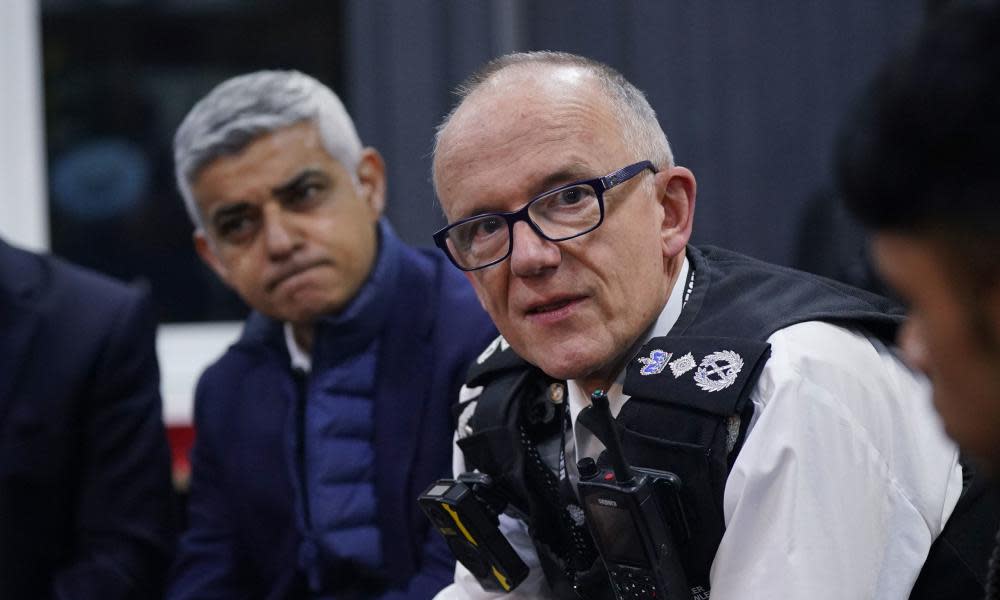Khan criticises Rowley’s refusal to describe Met as institutionally biased

Sadiq Khan has publicly clashed with the commissioner of the Metropolitan police, saying he disagrees with Sir Mark Rowley’s refusal to describe his force as institutionally misogynistic, racist and homophobic.
The mayor of London, one of two people who appointed Rowley, spoke as the fallout from Louise Casey’s bombshell report into Scotland Yard continued.
Labour attacked the government for complacency and Rowley insisted in a round of broadcast interviews he was committed to radical reforms.
The Guardian understands police chiefs around the country fear a “contagion” effect from the revelations about the Met damaging confidence in their forces hundreds of miles away from London.
Casey’s report warned public trust was “broken” and Britain’s biggest force was failing women, ethnic minorities, as well as gay and lesbian people – both as members of the public and Met employees.
Her report, which was ordered by the previous Met commissioner, revealed stories of rape victims being failed, female Met officers and staff being attacked at work with culprits going unpunished, and a force so rotten that Casey warned it could face being broken up unless it demonstrates radical change.
Related: Met chief needs time to turn things around – but patience is in short supply
Rowley says he accepts Casey’s findings, but will not adopt one of her main demands in describing the force as institutionally biased – even though his own office ordered her review in the wake of the Wayne Couzens scandal. The Met officer murdered Sarah Everard in March 2021.
Khan told the Guardian: “That’s one area where I simply disagree with him, on that point.
“I have spoken to Sir Mark at length, he accepts the factual findings, he accepts the racism, misogyny and homophobia finding, and he accepts the route map out of this.”
Khan ousted the previous commissioner, Cressida Dick, after losing faith she could lead the Met out of crisis, but said Rowley has his backing, despite the disagreement. He added: “I am confident he understands, unlike his predecessor, the scale of the problems. Also I have looked into his eyes, he is committed to the reforms required.
“If I thought he was being defensive or he was being resistant to change I’d let him know, and let Londoners know.”
Rowley says the label of “institutional” is confusing and political. “The institutional label, I understand,” he said. “It means different things to different people and also it’s become quite politicised as an idea.
“The practicality is yes we have those problematic individuals and we have systemic failings and we are taking action about both of them.”
Casey told LBC Radio that Rowley’s refusal to describe his force as institutionally biased disappointed her: “I do think this was the moment for the new Met commissioner to kind of right the wrongs of the past, and I think … he’s getting too caught up on the word.
“I mean, he broadly accepts the findings, and he accepts why I find institutional racism. He’s just uncomfortable with the word.”
Related: The Guardian view on the Casey report: the Met is rotting from within | Editorial
The Guardian understands the issue of the label about institutional racism, misogyny and homophobia was discussed before the report was released by Rowley and the home secretary. Suella Braverman opposes its use and even before Casey’s findings Rowley has never liked the term.
The Met is unique in having two political bosses, the London mayor and the home secretary. Khan said the Home Office should give up its power, with the London mayor left in sole charge as a main office holder the Met is accountable to. “I think it is long overdue,” Khan said.
Related: How can the Met police change its rotten culture if its leaders refuse to see it? | Sue Fish
The finding of institutional racism was first made against the Met in 1999 by the Macpherson report into the death of Stephen Lawrence, murdered by a white racist gang all of whom avoided justice for years.
His mother, Doreen Lawrence said: “Despite repeated reassurances that the Metropolitan police had learned lessons from its failures, discrimination in every form is clearly rampant in its ranks. It is not, and has never been, a case of a few ‘bad apples’ within the Metropolitan police. It is rotten to the core.”
Other forces fear the revelations about the Met will dent trust and confidence even though they are far away from London. One chief constable told the Guardian: “Everyone is our force is ashamed, because of what it says about policing.
“Is that the message we want our friends and family thinking about the police. Everyone in every community will be asking are our police like that.”
Rishi Sunak declined in a BBC interview to say his young daughters could trust the police. “Of course we need the answer to that question to be yes,” the prime minister said. “Clearly at the moment trust in the police has been hugely damaged by the things that we’ve discovered over the past year.”
In the Commons Braverman made clear her confidence in Rowley and said he needed time to make changes, while the Met commissioner opposed breaking up his force or changing its name. He told the BBC: “We can create chaos and an appearance of business and energy by doing some big structural thing.
“Actually, it will just get in the way of getting under the surface and digging deep, lifting stones and dealing with what’s there and changing the culture.”
Keir Starmer criticised the government’s “hands off approach” to delivering police reform and committed a Labour government under his leadership to introducing mandatory national rules for police forces on vetting.

 Yahoo News
Yahoo News 
